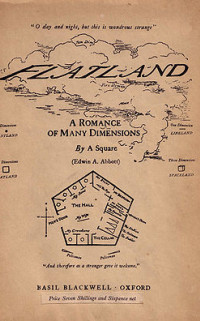I had known about Flatland for a while. I don’t know when, but my father told me about it quite long ago, and it always managed to fascinate me.
It was brought up more on various later occasions, but I never actually read it, mainly because I just didn’t read English books in general back then. I definitely had it on my to-read list, though.
Now, when my father departed from the company he had worked for for years, he got lots of gifts and presents. One of those was a DVD of a Flatland adaption. We watched it with the whole family, and it was really cool. By then I realised I could read this book for English literature.
I actually borrowed two copies of this book, because the first one I borrowed had seemed to disappear. Or perhaps it just left the third dimension, and it’s lying somewhere here still, in only two dimensions... but I got a new copy.
I had expected it to be relatively close to the movie. I had also expected it to be a bit tough to read, as I knew it involved a bit of mathematics.
- I should watch out to not spoil anything here, because this is the “before reading” section, and I’m writing it after reading xD –
But when glancing at the contents, I understood that the movie hadn’t been so close to the book, as this one discussed lots of subjects that weren’t discussed in the movie.
I’m going to write a summary now, using only what I remember, only reading the contents.
I This World
1. Of the Nature of Flatland:
Flatland is a world where only the two dimensions exist: width and length. It’s thus completely flat from a 3 dimensions perspective, but to the people in this world, it’s all there is.
2. Of the Climate and the Houses in Flatland:
The houses are made up out of walls, mostly in pentagonal shapes, but other shapes also exist. There are two holes as entrances, one for women, one for men.
3. Concerning the Inhabitants of Flatland:
The more angles a figure in Flatland has, the more respect it gets and the higher it’s placed on the social ladder. Every child gets one angle more than their parents. So with generations, more and more angles get added, until they are pretty much circles. The lowest order are the triangles. They are often not even perfect triangles as we often draw them, and do not have equal angles.
4. Concerning the Women:
The women in Flatland are straight lines. This makes them quite dangerous, as they can really hurt another figure if they walk into it, being so sharp. If they walk outside, they’re obliged to continuously scream, to let other know they’re coming, so nobody will run into them. That’s why you shouldn’t make a woman mad. They aren’t too good at thinking and hardly do anything of use, aside of reproduction.
5. Of our Methods in Recognizing one another:
While we from the third dimension could easily distinguish a hexagon from a pentagon just by looking at it from above, in Flatland that’s of course an entire different case, as they have no above. To them everything appears as a straight line. But they can recognise each other by feeling. In school, they learn to feel one’s angles, and if they’re good at it, they know if someone is an octagon or a nonagon by only feeling one angle.
6. If Recognition by Sight:
Even though everyone appears as a straight line, the higher educated figures actually recognise by sight. How? Well, if something is farther away, it seems dimmer, because of fog. So by looking at how quickly and with which intervals a line gets dimmer, it’s actually very well possible to distinguish between for example a pentagon and a heptagon.
7. Concerning Irregular Figures:
Irregular Figures are those who have not exactly equal angles. People have little respect for them, and if the angles are off by too much, the figures may actually be executed.
8. Of the Ancient Practice of Painting:
Long ago, someone had found out figures could be painted. It quickly became a craze, as everyone wanted to be coloured. This made distinction by sight much, much easier.
9. Of the Universal Colour Bill:
Because the inventor of this painting thought it was a great way to prevent many problems, everyone was obliged to have themselves painted. However, there was one big problem now: the art of both recognition by sight and recognition by touch decayed quickly.
10. Of the Suppression of the Chromatic Sedition:
This chapter tells how the story that started in chapter eight eventually ended. After lots of debates and almost massacres, the painting got forbidden.
11. Concerning our Priests:
The priests are the circles. Circles? Well, they obviously aren’t actually circles, but they have so many angles they aren’t countable anymore, and the figure appears as a perfect circle. They earn much respect, and rule the land for the most part.
12. Of the Doctrine of our Priests:
In the last chapter of the first part of the book, the teller of the story tells us more about priests, the chief priest, and more stuff that’s too complicated to remember.
II Other Worlds
[Let’s call the protagonist ■ from now on, for the sake of easy referencing]
13. How I had a Vision of Lineland:
In this chapter ■ gets a vision of Lineland. Lineland is a land that has only one dimension. ■ can see everyone in the land, and starts talking with the king. The king is quite baffled, he sees someone appearing and disappearing, after all. But yet he thinks ■ is a magician, and doesn’t believe him when he says he’s from a land with 2 dimensions.
Het boekverslag gaat verder na deze boodschap.
Verder lezen









REACTIES
:name
:name
:comment
1 seconde geleden